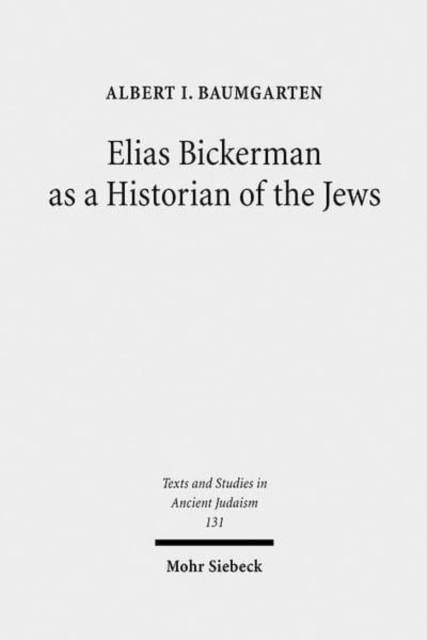
- Retrait gratuit dans votre magasin Club
- 7.000.000 titres dans notre catalogue
- Payer en toute sécurité
- Toujours un magasin près de chez vous
- Retrait gratuit dans votre magasin Club
- 7.000.0000 titres dans notre catalogue
- Payer en toute sécurité
- Toujours un magasin près de chez vous
Elias Bickerman as a Historian of the Jews
A Twentieth Century Tale
Albert Baumgarten
Livre relié | Anglais | Texte und Studien zum Antiken Judentum / Texts and Studies in Ancient Judaism TSAJ | n° 131
135,95 €
+ 271 points
Description
This biography of Elias Bickerman (1897-1981), one of the foremost historians of Graeco-Roman antiquity active in the twentieth century, focuses on his role as a historian of the Jews. Bickerman had an extraordinary life. He was born in Kishinev and grew up in St. Petersburg. He arrived in Berlin in 1922, where he pursued an academic career (Doctorate, 1926; Habilitation, 1930). With the rise of the Nazis, he moved to Paris in 1933, then to the USA in 1942. He died in Tel Aviv and was buried in Jerusalem.Albert Baumgarten explores the connections between Bickerman's life and his scholarly work on the Jews in its different cultural and academic contexts (Russian, German, French, and American). He argues that Bickerman intended to create a usable Jewish past. He further shows that Bickerman conceived the ancient Jewish encounter with Hellenism and the modern Jewish entry into European civilization in light of each other. He demonstrates that Bickerman argued that there were some ancient Jews who were wrong in the way they tried to bridge the gap between Judaism and Hellenism, while there were other ancient Jews who found the right solution. He illustrates the contemporary significance of these conclusions concerning the past for Bickerman himself and for other Jews of his time. Bickerman saw the circumstances of his life as a series of unfortunate dislocations. This book emphasizes the intellectual and academic benefit Bickerman derived from his life experience in the twentieth century.
Spécifications
Parties prenantes
- Auteur(s) :
- Editeur:
Contenu
- Nombre de pages :
- 377
- Langue:
- Anglais
- Collection :
- Tome:
- n° 131
Caractéristiques
- EAN:
- 9783161501715
- Date de parution :
- 31-12-10
- Format:
- Livre relié
- Format numérique:
- Genaaid
- Dimensions :
- 153 mm x 229 mm
- Poids :
- 706 g

Les avis
Nous publions uniquement les avis qui respectent les conditions requises. Consultez nos conditions pour les avis.






